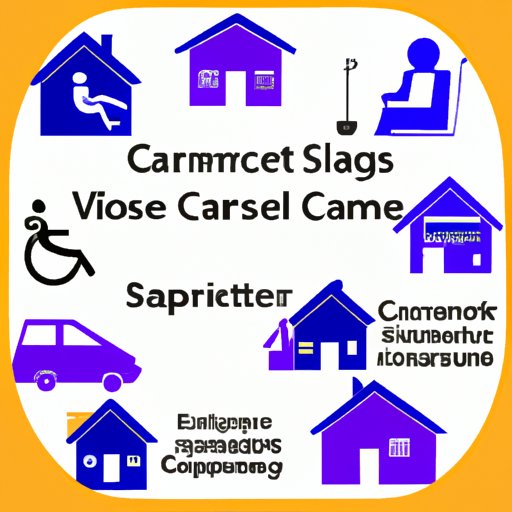Overview of Government Funding for Care Homes
The UK government offers a range of financial assistance and support services for those seeking care home accommodation. Depending on your individual circumstances, you may be eligible to receive government funding to help cover the cost of living in a care home. This article will give you an overview of the types of government funded care homes, eligibility requirements and different sources of government funding.
Types of Government Funded Care Homes
Government funded care homes are residential facilities that provide 24-hour care for elderly or disabled individuals. They offer a range of services such as personal care, meals, medication management, social activities and day-to-day support. The government funds these care homes through local authorities, NHS trusts or private care providers.
Eligibility Requirements
To be eligible for government funding to cover the cost of living in a care home, you must meet certain criteria. These include: being aged 65 or over, having a disability or long-term health condition, and being assessed as needing care and support. You may also be required to have a certain level of savings or income, depending on where you live.
Different Sources of Government Funding
There are several different sources of government funding available for care home fees. These include the following:
- Local authority funding – some local authorities provide financial assistance towards the cost of residential care. This is usually means-tested and is dependent on your individual circumstances.
- NHS Continuing Healthcare – this is a package of care that can be provided by the NHS to people with complex medical needs. It is free of charge and is based on clinical need rather than financial need.
- Personal Health Budgets – these are allocated by the NHS to individuals with long-term health conditions. They are designed to give people more control over their health and care.
- Attendance Allowance – this is a tax-free benefit available to people aged 65 or over who need help with personal care due to a physical or mental disability.

Cost of Living in a Care Home and Potential Government Assistance
The cost of living in a care home varies depending on the type of care you need and the location of the home. On average, it can cost anywhere from £600 to £1,500 per week. There are several types of assistance available from the government to help cover the cost of care home fees, such as Local Authority funding, NHS Continuing Healthcare and Personal Health Budgets.

How to Apply for Government Assistance
If you think you may be eligible for government-funded care home fees, you should contact your local council or health authority to discuss your options. They will be able to advise you on the different types of assistance available and how to apply for them. You may also be entitled to Attendance Allowance if you are aged 65 or over and need help with personal care due to a physical or mental disability.
Exploring the Pros and Cons of Government-Funded Care Homes
Government-funded care homes can offer many advantages, such as lower fees, higher quality care and access to specialist services. However, there are also some drawbacks, such as limited choice of care homes and long waiting lists. It is important to weigh up the pros and cons before deciding whether a government-funded care home is right for you.

Advantages of Government Funded Care Homes
- Lower fees – government funded care homes typically have lower fees than privately funded care homes.
- Higher quality care – government funded care homes often have higher standards of care than privately funded care homes.
- Access to specialist services – government funded care homes may be able to provide access to specialist services such as physiotherapy or speech and language therapy.

Disadvantages of Government Funded Care Homes
- Limited choice of care homes – government funded care homes are often located in areas where there is a shortage of care home places.
- Long waiting lists – due to the high demand for government funded care homes, there may be long waiting lists.
- Strict eligibility criteria – government funded care homes may have strict eligibility criteria that you must meet in order to be accepted.

How to Access Government Assistance for Care Home Expenses
If you think you may be eligible for government assistance for care home expenses, there are a few things you should consider. Firstly, you should understand the eligibility criteria for the type of assistance you are applying for. For example, Local Authority funding is usually means-tested while NHS Continuing Healthcare is based on clinical need. Secondly, you should look into how to apply for the assistance. This may involve completing an application form or attending an assessment. Finally, you should explore other potential sources of funding such as charitable grants or donations.
Support Services Available for Care Home Residents Through Government Funding
The government provides a range of support services for care home residents through funding. These services include respite care, day care, transport services, befriending services and advocacy services. To access these services, you should contact your local council or health authority. They will be able to provide information on the types of services available and how to access them.
Benefits of Using Government Supported Services
Using government supported services can offer many benefits, such as improved wellbeing, better quality of life and increased independence. It can also provide peace of mind knowing that you have access to specialist support if needed. Additionally, using government funded services can reduce the financial burden of paying for care home fees.
Conclusion: Summary of Key Points and Advice for Accessing Government Funding for Care Homes
The UK government provides a range of financial assistance and support services for those seeking care home accommodation. To be eligible for government funding, you must meet certain criteria such as being aged 65 or over, having a disability or long-term health condition, and being assessed as needing care and support. There are several different sources of government funding available, such as Local Authority funding, NHS Continuing Healthcare and Personal Health Budgets. If you think you may be eligible for government-funded care home fees, you should contact your local council or health authority to discuss your options.
Overall, government-funded care homes can offer many advantages, such as lower fees, higher quality care and access to specialist services. However, there are also some drawbacks, such as limited choice of care homes and long waiting lists. It is important to weigh up the pros and cons before deciding whether a government-funded care home is right for you.
Using government supported services can offer many benefits, such as improved wellbeing, better quality of life and increased independence. Additionally, using government funded services can reduce the financial burden of paying for care home fees. If you would like to access these services, you should contact your local council or health authority for more information.
(Note: Is this article not meeting your expectations? Do you have knowledge or insights to share? Unlock new opportunities and expand your reach by joining our authors team. Click Registration to join us and share your expertise with our readers.)
